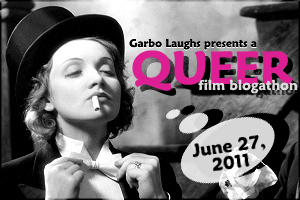Elena (2012, directed by Petra Costa) is an example of the widening scope of the documentary. It's a film that suggests that the word, "documentary," is insufficient to encompass all of the kinds of non-fiction films that are being made at this moment in time. Elena is factual, true, but it's a film that filters that factuality through a haze of memory, emotion, personal experience, and no small amount of visual poetry into a meditation on death and memory that transcends a dry recitation of facts and narrative.
Sunday, April 27, 2014
The Waters of Lethe
Posted by
Vulnavia Morbius
at
8:43 AM
0
comments
![]()
Labels: 2012, 2014, Brazilian film, documentaries, Elena (2012), films by women, South American Film
Wednesday, April 23, 2014
Homme Fatale
I spent some time over the winter watching Mark Cousins's mini-series, The Story of Film. While there's a great deal in that series to admire, there's also something about it that really rubbed me the wrong way: Cousins' privileges "classical" film, which is almost purely formalistic, over "romantic" film, which is more often conceived as entertainment. Cousins calls "romantic" filmmaking a "bauble," which seriously slants everything he presents. There's an unexamined assumption in this dichotomy that "classical" filmmaking is more "realistic" and truthful than "romantic" filmmaking, that the urge to entertain is somehow antithetical to truth, which is the core of art. This explains a lot about the landscape of film these days. "Classical" and "romantic" have become almost politicized. I was thinking about all of this as I walked to my car after seeing The Stranger by The Lake (2013, directed by Alain Guiraudie), which is a film that occupies the formalist "classical" camp. It's one of those European films that eschews quick cuts and a musical score and focuses on transgressive behavior. The only problem I have with it is that I didn't believe the film's central narrative. It's all well and good to confine your action to a single location, to keep non-diegetic music off the soundtrack, to look at the stickier facts of the physicality of human beings, but all of that is for naught if you fail to provide human beings that seem credible. This is the fallacy of pure formalism. The form doesn't always trump the content. "Realism" doesn't always mean real.
Note: spoilers abound here.
Posted by
Vulnavia Morbius
at
9:47 AM
2
comments
![]()
Labels: 2013, 2014, French Film, GLBT Cinema, The Stranger by the Lake
Wednesday, April 16, 2014
A Winter of Our Discontent
Captain America: The Winter Soldier (2014, directed by Anthony and Joe Russo) is the best of the Marvel Studios Avengers movies, one that manages the not inconsiderable feat of linking its eye-drugging fantasy with real world real politik in a way that engages the mind as well as the adrenal glands. It's also a film that cements the Avengers movies as an inheritor of the James Bond films, which they resemble more than they do the superhero movies from other studios. The Winter Soldier also argues forcefully against the grimdark superhero genre even as it indulges in some of its tropes. A deconstruction of the deconstruction? Maybe.
Posted by
Vulnavia Morbius
at
6:51 AM
5
comments
![]()
Labels: 2014, Captain America: The Winter Soldier, comics, Science Fiction, Superheroes
Wednesday, April 09, 2014
Welcome to the Dollhouse
I was having a conversation with a friend of mine after seeing Wes Anderson's new film, The Grand Budapest Hotel (2014), when he mentioned that he found the film's structure to be ungainly. He called it a matryoshka doll, one of those Russian dolls that nest progressively smaller dolls inside themselves. As a literal description of the film's structure, he's right. It's a narrative constructed of flashbacks within flashbacks--needlessly, my friend thought, because only one of the framing narratives has any real connection with the main thrust of the film. I think this is only a marginally useful description of the film. I prefer to think of it as a dollhouse, a comparison that has occurred to me before while watching Anderson's films: In the sequence in Moonlight Kingdom, for instance, when the house becomes a series of panels and the film turns into a kind of comics page. It's also a lot like a dollhouse that's been opened so that you can get to the rooms inside. As in that film, a lot of the humor in The Grand Budapest Hotel is predicated on dressing up its actors in elaborate costumes (no Harvey Keitel in short pants this time, unfortunately--Keitel plays a role more in keeping with his screen persona). I don't really know what it says about Anderson that he sees in film a huge dollhouse where Orson Welles saw a train set. Both directors see a vast toybox in any event.
Posted by
Vulnavia Morbius
at
8:38 AM
1 comments
![]()
Labels: 2014, comedy, crabby dissent, The Grand Budapest Hotel


















